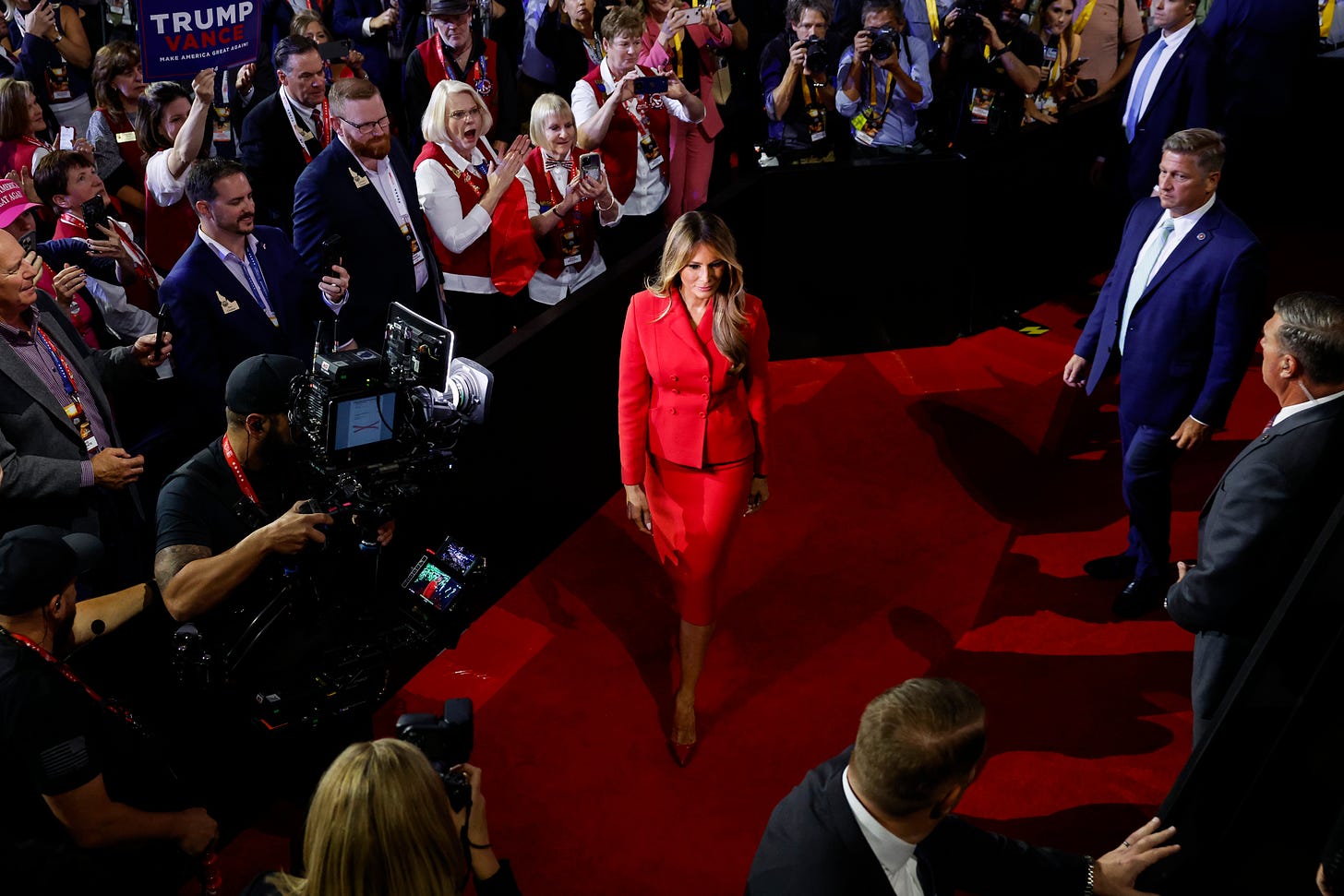
Melania’s Accidental Self-Portrait
Here is a mind like a machine, one that speaks in cover letters and can remember personal slights forever.

Melania
by Melania Trump
Skyhorse, 256 pp., $40
THAT THE TRUMPS, UNTIL QUITE RECENTLY, were a mainstay of the Styles section is a fact—embarrassing to various parties for various reasons—that Melania Trump’s new memoir will not let us forget. The book’s photographs, which make up a substantial section of an already slim volume, include a glamazon pregnancy photoshoot by Annie Leibovitz and a Vogue wedding cover story. In Melania’s telling, Anna Wintour herself flew with her to Paris to help her select the wedding dress.
These photos come from a cultural landscape that has since been significantly rearranged, but is impossible to memory-hole entirely—one in which the primary male love interest on Sex and the City was characterized (positively) as “the next Trump.” The brand was once inescapable as aspiration, not just as a juggernaut of negative polarization.
You might assume that Melania is its author’s attempt to survive the current fall from grace by inflating the soft landing bag of her own brand. The book announces itself with drama (and an homage to Tom Ford’s $140 coffee-table book): a monochrome black dust jacket from which the stark white letters M E L A N I A glare. Faint strains of Kraftwerk play whenever I look at it.
Visually, the book suggests a bid for icon status. Icons, like Cher or Big Dom, do not need last names (or, for that matter, the embattled husbands who bestowed them). Icons are luminous images, disturbing and potent in their ambiguity, like a biblically accurate angel. They may provoke hatred, but they transcend judgment. If you are an icon, for every screenager making TikToks about white women’s complicity, there will be another calling you some unprintable and adoring variation on “mother.”
Arresting, bizarre images were already one of the most memorable features of Melania’s tenure in the White House: the debonair villain outfits; her cryptic “I really don’t care, do u?” jacket; her menacing, sculptural, Christmas-in-the-discotheque decorations. So if you enjoyed Melania the image but abhorred Melania the first lady, Melania may look promising. Perhaps this is her opportunity to show us how the disparate sharp points we glimpsed during her husband’s administration belong to the same continuous edge of her personality. Is it finally time to #freeMelania, to spill the tea, to don the Tiffany blue kid gloves and embrace ominous red coniform Christmas?
REGRETTABLY, THIS IS A FALSE hope, for two reasons.
The first is that once past the cover you will find the book contains disappointingly little drama. Melania’s treatment of Melania is consistently closer to a first-draft cover letter than a juicy tell-all. Consider this passage, which I selected at random:
During the first half of 2017, I split my time between New York, Washington, and Mar-a-Lago, managing my duties as First Lady and supporting my husband’s administration. From waking Barron up in the morning to attending rallies and meeting with foreign leaders, every moment was filled with purpose and excitement. Juggling two full-time roles in different locations was exhausting but rewarding, and I embraced the challenge wholeheartedly.
The entire book reads like this.
The second reason is that the memoir is obviously a campaign book.
During Trump’s presidency, the role of softening, translating, and visibly advising him fell, somewhat unsettlingly, to Ivanka. Melania has taken over, it seems. Her account of the border controversy, in which her deep concern for detained children helps prompt an executive order reversing family separation, seems primarily to be an attempt to burnish her own legacy. Her comments on abortion, leaked before the book was published, create a sense of ideological distance from her husband while also imbuing him with plausibly deniable pro-choice sympathies (at the same time, to his pro-life supporters, he repeatedly takes credit for the overturning of Roe v. Wade). Again, ambiguity is potent: The motivated reader can read him any way they prefer.
But Trump comes in for his fair share of direct praise and defense, a decision hard to parse within a framework of distancing. And why, except for the pressures and needs of a campaign, would you make the vertigo-inducing attempt to paint Trump as an attentive family man, the head of a recognizable nuclear ménage, and the hero in their shared love story?
One of Melania’s early grudges against the press comes from her courtship: “They couldn’t see past our 24 year age difference. The gossip columns labeled me a ‘gold-digger,’ insinuating my affection for him was solely motivated by his wealth.”
This is probably fair enough. Perhaps no man is so devoid of qualities that he is married solely for his money. But the recrimination itself is more important here than the original incitement. Melania may be a campaign book, but attentive readers will see the places where the personality of its author could not be suppressed.
IF YOU HAVE A DISPASSIONATE INTEREST in public personalities, Melania was always an interesting specimen—a model who seems stiff and repellent on camera; a signatory to the cold but relatively moderate trophy-wife bargain who seems to have gotten much more than she thought she had bargained for. As a personality, Melania emerges directly in Melania only here and there, between droning lists of heads of state greeted with decorum, duties fulfilled, and action-items correctly executed.
We can see her for a moment in the introduction to her family, which must be all Melania. On page 10, we hear about the famous Raka onion.
When [Melania’s grandparents] returned to their village of Raka, nestled in the serene countryside just south of Sevnica, Anton wasted no time in pursuing his passion for agriculture. It was here that he would go on to breed a culinary masterpiece—the renowned raska čebula, or Raka onion, a sweet red variety that quickly became a favorite among the Slovenian people.
No ghostwriter or campaign adviser would insert this. Why would they care about the raska čebula? But Melania, it seems, is the kind of person who can take pride in an onion. I want to hear more! I want to sit down with her over an ice-cold bottle of plum rakija and make her tell me all about the family onion! Unfortunately, she immediately ushers us on.
From scraps like this, an indirect self-portrait slowly emerges. What we come to see is a mind like a set of gears, a mind that likes sports cars and industrial design and names like Citroën and Chanel; that derives satisfaction from duties laid down in well-marked grooves and rewards that you can see and touch.
It’s also a great mind for holding a grudge.
The first notable grudge comes just as young Melania has won an Italian modeling competition. (“And . . . I won.”) Distracted by the clamoring photographers, she gives the envelope containing her prize money to one of the contest organizers to hold for her. When she gets her things back, the money is gone.
As a renowned studio, Cinecittà should have upheld a higher standard of professionalism. The loss of the money itself was insignificant compared with the breach of trust that occurred. . . . A week later, an organizer reached out to me, extending an invitation to return to Rome and collaborate with their studio.
“We would like you to come back,” he said. However, my response was a resounding “no.” I had no desire to associate with individuals of such a deceitful nature. The lesson I learned from that experience is far more valuable than any material reward. Such dishonesty has no place in my life, and never will.
There is something almost admirable (or at least, if you are of a grudge-holding disposition, highly relatable) about the bizarre tenacity that would push Melania to go out of her way to name names in print over a thirty-year-old injury, dropping a leaden note into what is meant to be a triumphant montage of Melania’s steady ascension. But she clearly can’t help herself. That first grudge is another Raka onion—a moment when she emerges as a distinct personality, and in some ways a sympathetic one. Like Taylor Swift, Melania can’t forget what it felt like to be on a precarious upward climb, and can’t forgive the people who stepped on her fingers.
THE RATIO OF ONIONS TO GRUDGES, however, quickly becomes unbalanced. The same basic anecdote reappears. Melania is climbing the hill of excellence with unparalleled professionalism, integrity, talent, and prudence. Melania’s trusting nature betrays her into an unforeseen setback at the hands of treacherous or incompetent others. Melania learns her lesson, rises above, and lives to fight another day. Melania’s caviar-based (yes) skincare line (do not bother trying to find a sample on the internet, I already looked) goes up in smoke on account of her business partners reneging. In Chapter 8, “Why Was the Speech Not Vetted?,” her speech at the 2016 Republican National Convention becomes the focus of a plagiarism scandal thanks to the incompetence of speechwriter Meredith McIver (once again, Melania is willing to name names). The media is constantly promulgating lies about her.
For the reader, the effect is a growing queasy discomfort, akin to listening to an acquaintance tell you, at length, how much she “hates drama.” This is not to say that her grudges are all undeserved. An incident from the 2016 election, wherein nude photos from an out-of-print magazine were circulated in an obvious bid to humiliate her and portray her as a tawdry creature of the demimonde unfit for the White House, was an extremely nasty piece of work.
Her two-step argument about the photos offers another glimpse of personality. First, she defends herself on the grounds of art.
“The female form was once revered and honored in Western culture. Historically, artists produced magnificent paintings and sculptures that exalted the beauty of the feminine figure. Nudity was a medium through which humanity was elevated and celebrated.” Fair enough. But, as if unsure of this line of defense, she falls back on territory where she feels most comfortable: not intrinsic, but socially negotiated value.
“To me, those images were artistic and tasteful, fitting for a publication like Max, which showcased many renowned supermodels.” This is Melania’s home ground: prestige, name recognition, brand. It’s no wonder she was drawn to modeling, which is a kind of pure careerism—a job whose only product is an image of glamour, whose only object is to get and remain on top among the people who produce images of glamour. It’s no wonder she was drawn to Trump.
Petty vendettas, grubby profiteering, servile aspiration, brands without products: This is the world of Melania Trump, which is the world of the rich and fashionable. The Trumps have by now manifestly demonstrated how well the skills inculcated in that world will serve you in the theoretically distinct world of politics. I suspect it is for this visible blurring of the two worlds, in which so many ugly realities escaped containment, and not for their crimes and misdemeanors, that they will not be forgiven by either.





